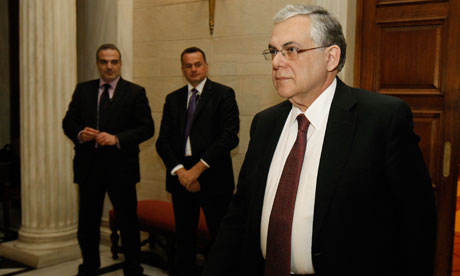Helena Smith in Athens guardian.co.uk, Wednesday 8 February 2012 20.36 GMT
Greek government official says the bailout agreement will be finalised because, simply, time is running out
Lucas Papademos, the Greek prime minister, earlier today. Photograph: Yiorgos Karahalis/AP
After three days of high drama, political posturing and brinkmanship, Greece's three-party coalition was expected on Wednesday to approve draconian terms attached to a €130bn (£109bn) rescue programme for the debt-choked country.
Ending weeks of economic deadlock, Athens' bickering party chiefs were poised to agree yet more belt-tightening – the price of further aid from the EU, European Central Bank and International Monetary Fund, the "troika" of creditors that have kept the country afloat.
Eurogroup chairman Jean-Claude Juncker invited eurozone finance ministers to meet in Brussels on Thursday to discuss the complex €130bn rescue. Christine Lagarde, managing director of the International Monetary Fund, will also attend.
"All the signs are that the agreement will be finalised because time has run out," said a senior government official.
Analysts said the move would come as a huge relief to European leaders, who had watched the continual delays to negotiations with a mixture of exasperation and disbelief. Eurozone finance ministers, already angered by Athens's perceived foot-dragging in implementing reforms, had hoped to have the bailout ratified on Monday.
Much had rested on the high-stakes talks, with the country ultimately looking at bankruptcy and a likely exit from the euro and EU if it had failed to accept the loan agreement. Athens has less than six weeks before it will be called to repay €14.5bn in maturing debt – a sum its state coffers simply do not have.
This week German chancellor Angela Merkel made it clear that the massive injection of cash would depend on enforcement of long overdue reforms, reiterating that she did not want Greece to leave the euro.
Officials said it was likely the deal, which will also see the country's debt being restructured, would be put before the Greek cabinet.
But while the political leaders backing prime minister Lucas Papademos's national salvation government were nearer than ever before to approving the tough conditions outlined in the accord, they signalled they would do so with a heavy heart.
The 50-page draft agreement, studied for much of the day after negotiations between Papademos and visiting debt inspectors, contains some of the most savage cuts in modern Greek history, with the minimum wage being reduced by 22%.
Supplementary pensions will drop by 15%, with Athens also agreeing to lay off 15,000 public sector employees by March. The measures come on top of a barrage of tax increases and wage and pension cuts over the past two years. On Tuesday, the European statistics agency, Eurostat, announced that one in three Greeks were under the poverty line – up from one in five before the crisis.
Entering the prime ministerial building before the marathon talks, Georgios Karatzaferis, leader of the small populist Laos party, spoke of an atmosphere of "blackmail" in which politicians had been forced to make decisions under extraordinary pressure.
"Time is [being used] as a blackmailing factor by our lenders," he said, highlighting the mood of mistrust between Greece and foreign lenders. "And that is a problem for me."
Debt inspectors have also insisted on seeing each one of the leaders separately following their endorsement of the plan. A clause specifying their strict adherence to the agreement was also inserted into the accord.
The terms under which Athens will receive the rescue funds — its second bailout in as many years — were much harsher than anticipated. A general election possibly as early as April is looming in Greece with no politician wishing to be associated with measures that will almost certainly worsen the country's deep recession.
"The package was much heavier than any of the leaders thought," said one well-placed official. "I don't think intellectually or psychologically they were prepared for what they have to accept or the sort of austerity that needs to be imposed. They've lived in a fantasy world refusing to believe the figures and thinking fiscal problems could be easily solved."
Trade unions, the communist party and employers' groups vowed that the backlash would be swift and sharp. Industrial action, in the wake of a general strike by public and private sector employees on Tuesday, would be intensified along with street protests, unions said.
"The working class and low income must now, with one voice and one fist, shake Greece," said the KKE communist party, adding the only way out of the crisis was for Athens to leave the European Union and default on its massive €350bn debt pile.
Greece closes in on bailout deal after three days of brinkmanship | Business | The Guardian
![The [Greek] European Tragedy](https://blogger.googleusercontent.com/img/b/R29vZ2xl/AVvXsEiWKI5s90SFm1wWTk6bs4p7CgslaC2SnYPsrZhb-B-smOufNNCSxCvpBLI9hOB-LsXZjir_PNmEiMk2-E62F3xkg96IoC6QFAaZAnPRTVH340IN9WBRmWJqPkjWlgyRj3zpALp7h6hvA58/s920/GkBack_new.jpg)
